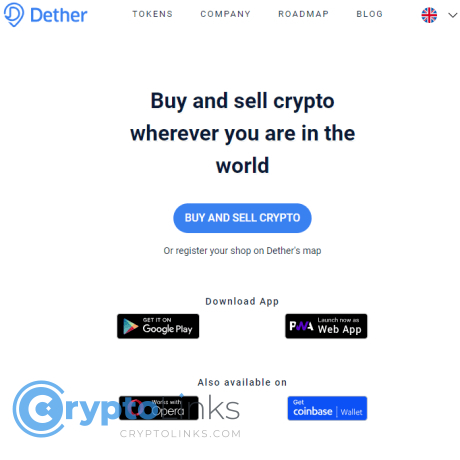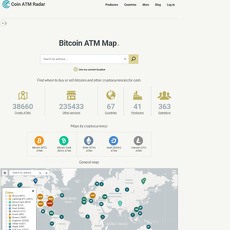Dether Review
Dether
dether.io
Dether Review 2025: The Easiest Way to Buy Crypto with Cash (No Stress, No KYC)
Ever imagined grabbing some Bitcoin or Ethereum with cash, in-person, without giving up your ID, bank account, or privacy? If you think that’s just wishful thinking, let’s see if Dether can prove you wrong.
Why do people struggle buying crypto peer-to-peer?
Honestly, the dream of “easy crypto access for everyone” often bumps into a wall when you actually try to buy or sell. Here’s how it typically goes on the big, well-known exchanges:
- Endless KYC ‘hoops’: You upload your driver’s license, a selfie, utility bills...maybe even your cat’s passport. For what? Sometimes, just to buy $50 worth of coins.
- Payment headaches: Card declined. Bank not supported. Long processing times—especially frustrating when the price is moving fast.
- High fees and hidden costs: You expect a small charge, but suddenly your $100 crypto buy is $94 once the dust settles. Annoying, right?
- Where’s the privacy? Your personal info gets stored—sometimes on overseas servers. Not everyone’s thrilled about that.
This leaves plenty of people stuck on the sidelines, or relying on friends or sketchy “local sellers” to get started with crypto. It shouldn’t be this complicated or risky.
How this review will help you
If you’re looking for a straightforward, private way to get crypto with cash or local payments (without signing your life away), you’ll want to see how Dether works. In this honest review, I’ll:
- Walk through how peer-to-peer crypto exchanges stand out (especially when cash payments are an option)
- Unpack why Dether’s model offers more freedom—plus, what you should watch out for to keep your coins safe
- Share the must-know pros and cons, so you don’t regret your first P2P crypto trade
Most guides out there dance around the details, or just list features. Here, you’ll get the experience of someone who’s used these platforms for real money and real transactions.
What’s coming up
Still curious? I’m about to answer the questions on your mind, like:
- What exactly is Dether and is it really ‘private’ or just another empty promise?
- How do peer-to-peer exchanges change the game, and can you really skip the KYC hassle?
- Can you spend your crypto—or Tether—outside the internet, in the real world?
Wondering if trading crypto face-to-face or with local payment methods is as easy as it sounds? Or maybe you’re thinking about security risks, or if you’ll really get the best deal?
Stick around, because in the next section, I’ll show you what sets Dether apart—and exactly how it lets you buy or sell crypto using cash, right in your neighborhood (or even online, if that’s more your style). Ready to see what’s possible? Let’s get to the good stuff.
What is Dether and How Does it Work?
Ever wish you could just hand over some cash and walk away with Bitcoin or Ethereum in minutes—without the drama, the paperwork, or feeling like someone’s always watching? That’s where Dether comes in and, honestly, it’s a bit of a game-changer.
Dether Explained in Simple Terms
Let’s keep it real: lots of crypto platforms claim to keep things “peer-to-peer,” but most still run you through hoops. Dether flips the script. This platform lets you buy or sell crypto straight to another person—face-to-face in your city, or online—using cash, local payments (like your favorite mobile money app), or even gift cards. No official ID, no bank account, and no endless forms. Just a crypto wallet, location access, and a willingness to make a fair trade.
- Cash is King: Meet up in person and swap cash for crypto—no middlemen, no records getting sent off to who-knows-where.
- Local Payment Magic: Use services people actually have, like Venmo, PayPal, MTN Mobile Money, or M-Pesa, depending on your country.
- Gift Cards? Yep. Sometimes, sellers even accept Amazon, iTunes, or other mainstream gift cards, giving you flexibility you just won’t get at big exchanges.
Remember that old saying,
“Not your keys, not your coins”
? On Dether, you always control your own wallet, so your crypto stays your crypto—until you decide to trade.
Step-by-Step: How to Use Dether
Let’s break it down—a typical Dether trade is super straightforward (and way less intimidating than most apps make it look):
- Create Your Wallet: Download the Dether app (iOS or Android) or access their web app, then set up a non-custodial Ethereum-based wallet. No central account, just a wallet you own.
- Share Your Location: Dether shows a map of local buyers and sellers. Pick someone nearby, or filter by payment method if you only want, say, people who take cash or local bank transfers.
- Negotiate Terms: Message the other person inside the app—agree on the price, amount, and how/where to meet up (or if you’ll use an online payment method).
- Finalize the Deal: Meet in public, swap cash for crypto, or exchange via your chosen online service. The crypto goes wallet-to-wallet. No middleman, nobody holding your funds.
Real talk: I’ve seen people in places like Lagos, Paris, and Bangkok using Dether to quickly buy ETH with cash at a corner café. It brings crypto into the real world—where normal folks actually live.
Security and Privacy on Dether
It’s one thing to offer “privacy friendly” trading—but is it safe? Dether has some interesting features, but there are trade-offs.
- No KYC, More Privacy: Since you don’t upload an ID, there’s much less data for hackers (or nosy third-parties) to steal.
- Direct Wallet Transfers: You control your wallet at every step—no one can freeze, reverse, or “temporarily hold” your funds.
- Location-Based Anonymity: While you need to share your general area to find traders, personal details are never tied to trades unless you share them yourself.
Every system has its risks, and Dether is no different. Since it’s peer-to-peer and in-person, double-check all details, meet in safe public places, and be cautious of fake bills or phishing attempts. I’ve heard stories of great trades and a handful of scammers—so trust, but verify!
Supported Cryptocurrencies and Countries
You’re probably wondering what you can actually buy or sell—and if Dether works where you live.
- Supported Coins: Dether focuses on Ethereum and ERC-20 tokens, especially ETH and stablecoins like USDT (Tether). Some users offer BTC and other coins, but you’ll see the best options for ETH-based tokens.
- Global Reach: Dether works in 140+ countries—including major hubs like France, the UK, Nigeria, Kenya, South Africa, Indonesia, the Philippines, India, Argentina, Brazil, and more. Liquidity depends on how many people are active in your city—urban areas often have a lot more choices.
It’s this flexibility and reach that keeps people coming back, even if you’re somewhere the big exchanges tend to ignore.
Feeling curious about how peer-to-peer crypto compares to those big “official” exchanges you’re used to? There are some key differences that might surprise you—let’s explore those next, and see why P2P trading is getting so much buzz. Ready to see how the power really shifts in your favor?
Peer-to-Peer Crypto Exchanges: Why Are They Important?
If you’ve ever wished for more control and privacy in your crypto deals, peer-to-peer (P2P) exchanges are where things get exciting. Let’s look at why these platforms even matter in a world crowded with huge, centralized exchanges chasing your ID at every turn.
Key differences: P2P Vs centralized exchanges
Here’s the thing—big centralized exchanges want to know everything about you, from your passport number to what you had for breakfast. Ever tried signing up at one and been stuck waiting days for verification, only to be told you need to upload even more documents?
P2P platforms flip the script:
- Freedom to choose: P2P lets you decide who you trade with, how you pay, and even where to meet up—think cash in hand at your local coffee shop, rather than being locked into a single payment method.
- Privacy built in: No need to hand over personal details if you don’t want to—a lifesaver for anyone valuing privacy in their transactions.
- Flexible payment options: Instead of the usual bank transfer or card, you can go for cash, mobile payments, or even gift cards.
A 2023 Chainalysis study showed that in regions facing financial restrictions, P2P usage is surging. The reason? More people want to bypass banks and move value privately, on their terms.
"Privacy is not an option, and it shouldn't be the price we accept for just getting on the Internet." – Gary Kovacs
That same spirit drives crypto users to P2P, ditching forms and approval queues for direct trading.
Types of P2P crypto exchanges
It’s not just Dether—P2P platforms come in a few flavors, each offering a different spin on control and security:
- Centralized P2P exchanges: Platforms like Binance P2P still hold some power—they’re gatekeepers but not full-on overlords. They connect buyers and sellers but may require KYC in some cases.
- Semi-centralized: Think LocalBitcoins or Paxful (before changes). They often hold funds in escrow until both sides say the deal’s fair. You get some security, plus more privacy than traditional exchanges.
- Fully decentralized: Here’s where Dether shines—no middlemen, wallet-to-wallet trades, your keys, your coins, your business. These platforms put all the power in your hands, making you responsible for your own deals.
Dether cuts out even the minimal oversight other platforms have—you set the terms, you meet up, you walk away with your coins. It's like trading at a street market, but digital—fast, flexible, and personal.
Real-life benefits of P2P
What does all this mean for someone just wanting to buy or sell crypto?
- Low fees: No big corporation taking a chunk with every move. Most P2P traders only pay small match-making or network fees, not the fat markups you’d see on regular exchanges.
- No endless waiting: Skip all that “pending approval” and “please verify your identity” nonsense. Deals can happen in minutes, even seconds, when both sides are ready.
- Your choice of payment: If you want to pay or get paid in cash, local mobile money like M-Pesa, PayPal, gift cards, or even coffee beans (not kidding, that’s happened!)—you can often find someone willing to trade on your terms.
A lot of people around the world—like students in Nigeria, small business owners in Turkey, or freelancers in Argentina—are already using P2P for exactly these reasons. Need to sell ETH for your local currency in cash tonight? Want to pay for dinner with crypto without needing a crypto debit card? It’s right there if your P2P platform is active in your city.
But, is this freedom too good to be true? There are a couple of big reasons why people keep choosing P2P—and why you might want to as well. Up next, you’ll see why more and more crypto fans are making the switch for lower fees, more privacy, and better control over their crypto. Ready to find out if it’s really worth it? Keep reading—what you discover might just change the way you think about crypto trading.
Why Use Dether or Other P2P Crypto Exchanges?
It’s no secret—if you want to cut through the middlemen and experience true financial freedom, platforms like Dether are a massive game-changer. But what really sets P2P crypto exchanges apart from the rest? Let’s break it down—because once you get these points, there’s really no going back to business as usual.
Lower Fees and Better Deals
Ever felt stung paying 3-5% on a “simple” crypto trade at a big-name exchange? Yeah, not fun. P2P exchanges often massively undercut these fees, letting real people set their own rates. Sometimes, you’ll stumble onto deals that simply don’t exist anywhere else—especially in local markets where quick cash or flexible payments are in demand. In fact, a recent study by CoinDesk found that P2P exchanges can charge up to 50% lower fees compared to mainstream CEXs (centralized exchanges).
Why pay the banks and exchanges extra, when that saving could be yours?
Avoiding KYC and Staying Private
If you ask most crypto users why they’re obsessed with P2P, you’ll hear a familiar tune: privacy. The world keeps demanding more selfies with your ID, proof of bill payments, and “why do you want this Bitcoin?” questions. Dether flips the script. No mountains of personal info. Just people, trading directly.
"To be yourself in a world that is constantly trying to make you something else is the greatest accomplishment." — Ralph Waldo Emerson
It hits different when you know you can transact privately. Whether you’re an activist, someone living under strict regulations, or you just value your data—protecting it matters more than ever. Privacy isn’t about hiding; it’s about choice.
Wide Payment Choices and Real-World Options
Here’s where things get interesting. Not everyone has a credit card, PayPal, or even a bank account. Dether opens the door for:
- Cash deals—face-to-face, old-school style.
- Mobile payment apps—use what’s popular locally. Mpesa, Alipay, Paytm ... you name it.
- Gift cards—trade what you have for the crypto you want.
One guy in Berlin bought Ethereum last week using nothing but a couple of Amazon gift cards and a quick meet-up at a cafe. Try doing that on a regular exchange! The flexibility is unreal, especially in areas where banking access is tight or unreliable.
Control Over Your Crypto
Imagine always holding your crypto in your own wallet, not trusting some faceless exchange to look after your coins. That’s real ownership. With Dether, there’s no waiting for withdrawals, worrying if a platform will freeze your funds, or praying that your assets are safe during a service outage.
- Your keys, your coins. Period.
- Instant transfers—see your crypto in your wallet, not in some limbo balance.
A shady centralized exchange might one day disappear with your savings (just Google the endless list of crypto exit scams). Using P2P, you’re always just a transaction away from real-world cash, spending power, or the next investment—no middlemen bottlenecks.
But with all this freedom, what’s the catch? If it’s so good, why isn’t everyone using P2P for every trade? Trust me—there are some things you seriously need to check before you start flipping coins with strangers. Wondering if there are risks, legal hurdles, or tricks to avoid? Stick around—up next, I’ll show you exactly what you need to watch out for (and how to pick the safest P2P platform for your needs). Ready for the inside scoop?
What to Watch Out For When Using P2P Crypto Exchanges
So you’re eyeing Dether or any peer-to-peer crypto platform to skip the drama of KYC and high fees. That’s smart—but even the best P2P platforms come with things you need to keep front and center. Here’s what I always check (and why it can make or break your experience):
Liquidity and User Base
Ever tried to buy or sell crypto, only to find there’s nobody on the other side of the trade? This is what poor liquidity looks like, and it sucks the energy (and profitability) right out of your P2P hunt. The bigger and more active the community on the platform—think more buyers, more sellers—the faster and easier your trade goes down. Imagine searching for cash buyers in a small town versus bringing your cryptos to a busy city street market. You know which one moves quicker.
If you’re targeting a specific coin or payment method, always check how active those markets are in your region. A low-traffic area could mean your buys and sells take forever (or never happen).
- Tip: Check out liquidity stats or user feedback before signing up. Fast matching = high liquidity.
Is Dether Legal in Your Country?
This can’t be overstated: If crypto is in a regulatory gray zone where you live, using any platform (even P2P) might land you in hot water. Dether may seem accessible, but you need to be sure it’s allowed for users in your location. Not every P2P exchange plays nice with every country’s rules—and ignoring that could mean lost funds or worse.
- Look up your country’s crypto stance (local government websites or trusted news sources are your friends here).
- Peek at Dether’s own site for a list of restricted regions—sometimes this is hidden in the FAQs or Terms of Service.
Transaction Fees and Hidden Costs
P2P platforms sell themselves on the “low fees, better deals” promise. But always look past the big headlines. On Dether, you’ll see transaction and service fees laid out, but sometimes there are sneaky extras: network gas costs, conversion charges, or markup built into the buy/sell rates people set for themselves. One small fee per trade may feel like peanuts, but stack these up over time and it’s suddenly not so peanuts after all!
- Read the fee schedule. Make sure there are no “surprise” withdrawal or escrow costs.
- Compare the buyer’s/seller’s set price to the real market rate—sometimes the deal isn’t as good as it looks.
Security and Customer Support
No joke—P2P trading means less middleman, but also less hand-holding if something goes sideways. You’re responsible for your own privacy and security.
- Security features: Look for multi-factor authentication, escrow for trades, and clear procedures in case of disputes. Dether offers some protections, but nothing’s bulletproof.
- Customer service: Is there real support if you get burned by a scammer or run into tech issues? The best platforms have active dispute resolution, guides, and quick response teams. If there’s only a chatbot and nobody answers your emails for days… beware.
More and more vendors now offer support in multiple languages. It’s a bonus if you prefer communication in your native tongue—never underestimate how helpful this is when troubleshooting gets stressful!
Other P2P Platforms Compared
I’ve seen firsthand that not all P2P exchanges are built equal. LocalBitcoins, Bisq, and Paxful each have unique pros and cons, community rules, and favorite payment methods. This is where my experience and reviews on Cryptolinks become your secret weapon. I analyze:
- How fast you can get a deal
- Real fee structures
- Customer support that actually helps
- Which ones are best for cash, e-wallets, gift cards, or specific countries
Choosing the perfect P2P crypto platform is like picking a good pair of shoes—one size never fits all. If you’re still unsure, my comprehensive guide to P2P exchanges digs into these aspects so you don’t end up stuck with blisters (or worse, lost funds).
Ready to get answers to the burning questions about Tether, payment methods, and spending your fresh crypto in real life? Don’t miss what’s coming up next—I’ll unpack everything you need to know to turn that digital cash into something you can actually use. Stay tuned!
FAQ: Tether, Payments, & Spending Crypto with Dether
Let’s get real about what you can actually do with Dether, especially if you’re into Tether (USDT), want to pay with crypto, or are just wondering how it all stacks up in the real world. Here are some quick answers to the questions you’ve probably Googled a million times—plus some tips nobody else tells you.
What is the Tether (USDT) payment method?
Tether (USDT) is a stablecoin pegged to the US Dollar, so 1 USDT usually equals $1. Unlike Bitcoin and Ethereum, which jump up and down in price, USDT *stays steady*. That’s why loads of people worldwide prefer to use Tether for payments, especially in P2P trades or places where local currency is inflation crazy.
Imagine this: you meet someone on Dether, agree on a price, and pay each other in Tether. No need to worry if the price will moon or crash in the next ten minutes. This stability makes it especially great for merchants, freelancers, or anyone who wants to move money privately without worrying about sudden price dives.
- Fast transactions: Send USDT almost instantly, with low fees.
- Pegged to the dollar: Keeps things simple—no price shocks.
- Widely accepted: Grows in popularity among P2P and real-world shops.
Some studies are showing that stablecoins like Tether account for almost 80% of trading volume on many crypto exchanges. That’s huge. So, it makes perfect sense that Dether supports it front-and-center.
Where can you spend Tether?
This is the fun part—because, let’s be honest, owning crypto is only half the story. You want to actually use it, right?
- Online stores: Tons of online e-commerce shops now accept USDT for everything from gadgets to clothes—think Newegg, Travala, and even some VPN providers.
- Travel bookings: Planning a holiday? Sites like Travala let you pay for hotels and flights with USDT.
- Gift cards: Use platforms that accept Tether to buy Amazon, Netflix, Uber, and other gift cards. Perfect if you want to “crypto your life” without waiting for mainstream acceptance.
With Dether, if the shop you want to buy from doesn’t accept Tether directly, you can always swap your USDT for cash or a local payment method with someone nearby. It adds a whole new layer of freedom, especially in countries where crypto isn’t exactly mainstream yet.
Is Dether safe to use?
Security is always top-of-mind for P2P crypto—rightfully so. Here’s what to keep in mind:
- Wallets: You control your own funds. Dether doesn’t hold your crypto—the private keys are yours.
- Privacy first: No forced KYC. This keeps your personal info away from hacks and leaks, but also means you need to choose your trading partners carefully.
- Reputation system: Always check ratings before setting up a trade—just like you would look at reviews before booking a place on Airbnb.
- Meet in safe places: If you’re doing a face-to-face deal, pick public places, and maybe even bring a friend. I’ve read on Reddit about users doing it at coffee shops or inside banks for extra peace of mind.
One thing that stands out: not every trade is risk-free. Occasionally, I see reports of scammers on all P2P platforms—that’s not unique to Dether. But the project’s reputation for privacy and its long community track record are solid positives. Just stay sharp, trust your gut, and use the tools Dether gives you.
The final word: Should you try Dether?
If you want to buy or sell crypto without giving up your privacy or going through endless sign-ups, Dether is one of the most interesting options around. The mix of flexible payment methods, solid privacy, and freedom to spend crypto anywhere makes it a powerful tool—especially if local exchanges just aren’t cutting it.
Pro tip: Never jump into any P2P trade without checking out the person you’re meeting, understanding the process, and double-checking the details. It’ll save you a headache later.
If you think Dether sounds like your kind of thing, I recommend exploring even more vetted P2P platforms and crypto tips on my main site. The world of crypto is all about freedom and control—why not make the most of it?






